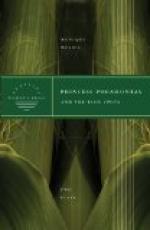“We are quits,” said Captain Waldo to Buckler; “the maids frightened us with their masks and we have frightened their braves with our muskets.”
Powhatan in the red robe and crown seated himself upon the mats that were brought out to him, and Smith whispered to one of the gentlemen who had accompanied him:
“In faith, Radcliffe, is he not more kingly looking than our royal James?”
The idea of a coronation had seemed absurd to him, and he had believed that the old chief would appear ridiculous decked out in mock finery, but he admitted to himself that such was far from being the case.
Then the feast was brought on and the Englishmen again did full justice to the Indian dishes. Pocahontas came and sat beside Smith.
“Welcome, little Sister,” he said, “and how dost thou like thy father’s new robes?”
“He appeareth strange to me,” she answered, “but he will not wear them long. It is beautiful, that cloak, but he can paint his flesh as fine a color with pocone, and it will not be so warm nor so heavy.”
Smith laughed.
“Wouldst thou not like to try to wear clothes such as our women wear? Perchance thou mayst try what they are like before long, for soon we shall be seeing white squaws come over on the ships.”
“Do white men have squaws, too?” asked Pocahontas in astonishment.
“For a surety. Didst thou think Englishmen could live forever without wife or chick at their hearths?”
“And thou, my Brother,” she queried eagerly, “will thy squaw and thy children come soon?”
“I have none, Matoaka; my trails have led through so many dangers that I have not taken a squaw.”
“But a squaw would not fear danger if thou couldst take her with thee, or if not, she would wait in thy lodge ready to welcome thee on thy return. She would have soft skins ready for thy leggings, new mats for thee to sleep upon; she would point out all the stores of dried venison she had hung on her tent-pole while thou wert gone, and fresh sturgeon would she cook for thee and prepare walnut-milk for thy thirst.”
“’Tis a pretty picture thou drawest, Matoaka,” he answered, yet he did not laugh at it. “Often I feel lonely in my wigwam and I wonder if some day I shall not bring a wife into it.”
“There would be none who would refuse thee,” answered the girl simply.
Smith did not take in the significance of her words, yet his thoughts were of her. Suppose he should throw in his lot altogether with this new country and take for wife this happy, free child of the aboriginal forest? It was only a passing thought. He had not time to consider it further, for Newport had risen and gave the signal for them to start on the return march to Jamestown. He rose, too, and bade farewell to Pocahontas.
During the feasting Powhatan had been thinking over what he meant to do. Gravely he presented to Captain Newport a bundle of wheat ears for spring planting; then with the utmost dignity, he handed him the moccasins and the fur mantle he had laid aside when they placed his coronation robe upon him. Newport received them in amazement, not knowing what he was to do with them; but Smith made a speech of thanks for him.




